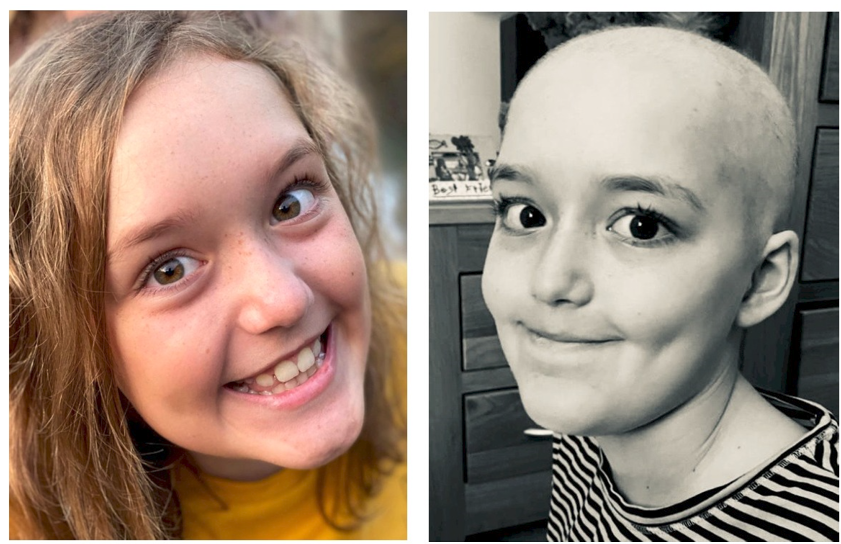By Bone Cancer Research,Thomas Ogg
Copyright jerseyeveningpost

A new family-friendly fundraiser – March of the Inflatables – was due to take place at the weekend in memory of Beth Phelps, who died of cancer in 2022, just 12 days shy of her 13th birthday (it was cancelled due to poor weather). Organiser – and Beth’s mum – Aby Phelps spoke to TOM OGG about her ‘amazing and very quirky’ daughter and about the importance of raising awareness of cancer in children and young adultsTHE poor weather over the weekend in Jersey sadly resulted in a planned fundraiser being cancelled.Titled “March of the Inflatables”, the family-friendly event would have seen Islanders walking – or running – 2.5-3k from Les Jardins de la Mer to the Look Out Beach Café and back, and all while wearing something inflatable, be it an inflatable comedy hat, a full-body inflatable costume or otherwise. The good-humoured event – which will now take place at a later date, to be announced ASAP – was aimed at raising awareness and money for Love Beth, a charity fund which is supported by Bone Cancer Research Trust, and which was founded by Aby and Ben Phelps in memory of their 12-year-old daughter, Beth Phelps, who died of cancer in October 2022.The idea for March of the Inflatables stemmed from one of Aby and Ben’s many happy memories of Beth and her love for eye-catching fancy-dress costumes.“It was 2021 and Beth was receiving treatment at UCLH [University College London Hospitals NHS Foundation Trust],” says Aby, speaking earlier this week. “We were hoping that the treatment would come to an end in September of that year, but, of course, nothing was a given and we knew that. We asked Beth, if we did make it home to Jersey for her 12th birthday in October, what would she like to do? And her answer was simple: she wanted to go trick-or-treating with her friends on Halloween while dressed in an inflatable dinosaur costume. “Roll on 31 October, Beth had finished chemotherapy and radiotherapy, she had rung the end-of-treatment bell in Southampton, and she had been given the all-clear of cancer – she could finally go home after nine months away. “And so it was she and her friends dressed up, with Beth in her massive dinosaur outfit, and they proceeded to have the funniest night ever. It was amazing to see her being a kid without a care in the world at long last.“We came up with March of the Inflatables in order to remember Beth laughing with her friends and to remember her love of dressing up. We would love this to be an annual event, raising laughs in Beth’s memory each and every year.”As well as raising laughs (and plenty of funny photo opportunities), the inaugural March of the Inflatables will also be raising awareness about bone cancer in children, something which is, says Aby, “terribly underfunded” by the UK government.“Children’s cancer is still a taboo subject matter,” she says. “We are now much more open about talking about adult cancers, but how often do you see adverts on TV showing children’s cancer charities? Cancer treatment for children is also extremely outdated, some of it going back 30 or even 40 years.“This is why it has been so incredibly important for us to support Bone Cancer Research Trust, which is a charity that both supports patients and supports the all-important scientists who are discovering new and kinder treatments.“When we first started to meet other parents with children who were going through various types of cancers, we were shocked at how many parents had been back and forth to the doctors or A&E with their son or daughter over months and months, only to be told the reoccurring pain was probably just growing pains or an old sporting injury. Children have growth spurts, as we all know, hence such things as growing pains. But cancer cells can grow in line with growth spurts and these ‘rogue’ cells multiply at an alarmingly fast rate, which makes it paramount to catch cancer early in children and young adults before it spreads.”The cancer that afflicted Beth was called “Ewing sarcoma”, a rare and aggressive form of cancer that mostly occurs in children and young adults, and which begins as a growth of cells in bones and/or the surrounding tissue.“Beth hadn’t shown any obvious signs of illness,” says Aby. “She was a bit tired and she was also suffering with the odd night sweats, but both of these symptoms were quite normal for Beth – they didn’t seem in any way extreme. Then, literally over the course of a day, a lump appeared on her left shoulder blade. It was very large, roughly the size of half a golf ball, and it hadn’t been there the day before. So treatment was immediate because, unknowingly to us, the cancer had progressed quite a lot, but we didn’t know this until it physically appeared on her shoulder and we could see it.” It is a turn of events that is, for many, a worst-case scenario situation. How, then, did Aby and Ben find the strength to get through it?“Oh, initially we were terrified and angry,” says Aby. “You’re completely out of control, both of your life and of the little life which you swore you would protect with your own forever but which it is now beyond your abilities to protect physically. It’s a spiral of darkness and despair, feeling sick every day. But there was light in the form of professional medical staff and mental-health professionals, all of whom gave priceless support.” Initially, Beth underwent nine months of chemotherapy, alternating on a two-weekly rotation, with one combination lasting six days and the other three days, followed by surgery to remove the tumour and the affected bone. “The team at Southampton were just incredible,” recalls Aby. “As Beth’s treatment progressed, this new world – of hospitals and of living somewhere strange – became oddly familiar and safe. You knew you were in good hands – and this gave us hope. “As parents, ‘hope’ is the only thing you can cling onto when everything else is so uncertain. You have to give up the natural inclination to have control, because suddenly nothing is in your control. But when the parents have hope, this is then passed onto the child. Beth could see we were positive about the outcomes, positive about the next steps, and this was because of the hope we held onto, and this in turn meant Beth always felt safe and secure that we were in some way in control and that we had her protected. “You asked what gave us strength? That’s easy: Beth did. She was incredible. She was a total rock throughout it all. She taught us how to be good people – she was simply the best.”Over the ensuing year, there were repeated further rounds of chemo, a gruelling ordeal for anyone, least of all a pre-teen child. And yet, throughout it all, Beth remained friendly and upbeat, playing games with her friends on her iPad from her hospital bed.I ask Aby if Beth, who was clearly very bright and very brave, was fully aware of the severity of her illness?“Beth had everything explained to her from the beginning,” she replies. “She was only 11 years old, of course, and so our explanations and those of the medical staff had to be tailored in a way to not presume she knew things already, but at the same time not patronise her and treat her like a baby. “It’s a tough age to get this balance right so with every change that occurred, the way we explained things was carefully considered before delivering the information to her. “Beth always took any news to do with the cancer with such incredible strength. Questions, worries and upset would arise at times when she would be one-to-one with either me or Ben, when we could have our honest chats without an audience, so to speak. She was a bright kid, but never asked too many questions about her illness. She very much lived in the here and now. I think sometimes she just didn’t want to know. We let her take the lead on that but we always told her no question was out of bounds and we would always be honest with her with whatever she asked. “Every child is so different as they grow and what is right for one child isn’t necessarily right for another. You have to respect that. It’s very easy to judge others until you go through something like this yourself.”By spring of 2022, Beth had been given the all-clear in three consecutive monthly scans. But then the pain returned, most notably in Beth’s right shoulder, and an X-ray in June delivered bad news: the cancer had returned, this time in her right lung. And the diagnosis was terminal.Beth died on Monday 3 October 2022, just 12 days shy of her 13th birthday.“When Beth was given a terminal diagnosis, our world was shattered for a second time, only this time all the hope we had before was now being ripped from under us,” says Aby. “At this point we were introduced to the Paediatric Palliative care team within Family Nursing and Home Care. To say this team of six ladies were incredible is an understatement. Each of them was so professional, so sensitive and so loving. They become one of the family, visiting every day towards the end of Beth’s illness. They were with us when Beth passed away and I cannot fault their support during this most horrendous time. I really don’t know how they do it. They continued to support us after Beth’s passing and still, to this day, we meet up with them and remember Beth. “We had, and still do have, support from so many friends and family, as well as from charities such as Family First, Jersey Hospice and Bone Cancer Research Trust.”Both Aby and Ben Phelps were born and raised in Gloucestershire. The pair had known each other for many years as friends before entering into a relationship in the early 2000s and then moving to Jersey in 2005. They married in 2008 in a ceremony at Le Catel Fort, with Beth entering their lives the following year. It was the arrival of Beth that proved the deciding factor in the couple choosing to remain living in the Island.“Beth was born in the autumn and this ran through all the things she loved most in life: cosiness, warmth, hot chocolates and chai lattes, marshmallows on the fire, watching Friends or cartoons like Gravity Falls while snuggled up under a blanket on her bed with her favourite teddy in the world: a tatty old lamb plushee called Lamy. “She loved animals, too, most of all her cat, Monkey, and her dog, Scrumpy. She was well known by many for her large and characterful collection of Jelly Cat toys.”Initially, Beth was quite a “shy and anxious” child but over time came out of her shell and developed many close friendships, with both boys and girls and always “filled with fun”.“She wasn’t a massively girly-girl,” says Aby. “She loved anything a bit creepy and scary, and so Halloween was one of her favourite times of year, as was playing games on Roblox that made her jump! “She loved to have a laugh about anything and everything. Her favourite pastime in her younger years was to dress up in silly outfits and put on shows and dances with her friends. She was protective of her good friends, she’d have their backs and they had hers. She hated any drama in life – she liked to keep things fun and simple.”Asked if any particular memories or moments spring to mind when thinking about Beth, Aby laughs and says: “Laughing – a lot! Random chats about all sorts of things in life. Her mind was amazing and very quirky. She loved working out puzzles, for example, and she was a massive Stranger Things fan – she loved to discuss what she thought would happen next. She questioned the world in her own unique way – we miss those chats so much.“To be honest, there are so many particular memories that we have from her short life, it’s hard to single out just one or two. Some of our favourite memories would be hearing her laughing loudly with her friends when they came to stay. She had such a unique laugh. She was an only child and so we had an ‘open house’ policy whereby all her friends were always welcome.“We thoroughly enjoyed holidays together, too. Her favourites were definitely Greece where she could swim in the crystal-clear warm water and have as many bubble waffles as she could eat. Also, we managed an amazing trip to Lapland just before she relapsed. This was truly magical and she had such a special time. She loved the snow and meeting with Father Christmas – it was a dream come true for her.”“She faced so many obstacles in life, but she was always so courageous.”Many, myself included, would say the same of Aby and Ben. It is, after all, impossible not to admire people who have experienced such all-encompassing loss, grief and heartache, and yet who have resolutely refused to let it destroy their lives. March of the Inflatables, therefore, is a testament to the courage of both Beth and that of her parents.As our conversation draws to a close, I ask Aby if she has any advice for mums or dads who fear their own son or daughter might be showing signs of serious illness.“Well, something that I think medical professionals really need to trust is a parent’s instinct,” she says. “Speaking to parents of children with cancer, I heard countless times that a parent showed concern again and again about their child and their concerns were dismissed. A parent knows their child better than anyone on this earth and so I would say, if something just doesn’t feel right then persevere with investigations. Because when it comes to cancer in kids, there’s literally no time to waste. There isn’t time to say ‘let’s keep an eye on it’. “And I would say to anyone who is going through a cancer diagnosis with their child, keep up the hope. Let the professionals do what they do best and stay positive for your child as they will be looking to you for that hope and strength. It’s tough but stay strong for them. If something doesn’t feel right, then question it and make sure you have a full understanding of what’s happening so that you can explain it to your child in a way they understand.“And lastly, don’t be afraid to ask for help. I never thought we’d need assistance from a charity, but I was so grateful we had various charities to support us.”*For more on Love Beth, or to donate, visit specialfunds.bcrt.org.uk/love-beth



